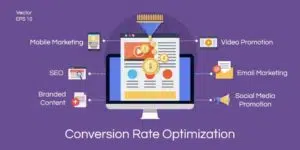
Law firm online marketing has an aura of fear surrounding it. It has evolved so fast that it’s almost impossible for even the most sophisticated firms to keep up with all the changes and best practices.
However, we can agree on one thing, digital marketing has become standard practice for any successful law firm.
Today, I’d like to eliminate that fear factor surrounding digital marketing by providing a clear-eyed perspective on why it doesn’t have to be daunting. We’ll also discover some effective strategies you need to implement for your law firm to succeed.
Are you ready? Ok, let’s dive right in!
Creating a Law Firm Online Marketing Plan
A marketing plan helps you come up with a thought-out strategy for the actions you’ll take, how you’ll do them, who will be responsible and the timeline for your marketing.
In addition, your law firm online marketing plan will include different ways you’ll measure the success of your marketing efforts. This will equip you with relevant data on where you’ll need to amend and update.
So, how do you write and execute a powerful marketing plan?
1. Understand your goals, key initiatives, and tactics
You have to deal with the why what and how to guide your marketing plan. The “why” section is basically the purpose of your marketing plan. What goals do you have when it comes to marketing your law firm? This could be:
- Establishing your firm as an authority
- Increasing awareness and credibility
- Generating new followers, prospects or clients
The next part is what marketing endeavors will you do to achieve either of the above goals?
For instance, let’s say your goal is to establish your firm as an authority. You could create weekly blogs, guest posting or even quarterly case studies.
On the other hand, to increase awareness of your services, networking would be a great option. Therefore, launching events, lunches or webinars can be a good start.
In addition, ongoing SEO optimization could help you generate new prospects continually.
Finally, you have to address how your firm will do these marketing initiatives. Will you outsource some of it or rely on your in-house team? How often will you do networking, blogging or webinars?
Having this big picture before you set out on the actual work will keep you focused and motivated throughout the timeline you set for your marketing targets.
2. Know your target client
Speaking of targets, you cannot overlook who you are trying to reach with all your law firm online marketing activities. The more details you have about your target client, the better your chances of converting them into clients.
Once you understand what drives your target clients, you’ll be able to create content that speaks to them by addressing their pain points and unique challenges. Then you can help them to trust you and believe that your firm is their best option to go to when they’re ready.
So take your time and do market research to determine:
- Who makes up your ideal client?
- What do they value most?
- What do they need for this problem?
- Where can you find them?
3. Study competitors to choose your law firm’s online marketing channel
A competitive analysis seeks to understand who you’re up against and where you rank. It also helps you to identify what they are doing right to emulate or wrong to avoid.
A great way to do this is by signing up for their newsletter to know how they communicate with their potential clients. You could also check out their social media channels to know their target clients.
Evaluate any loopholes in their marketing strategy and find ways you can outperform them. SEMrush is a tool you can use to discover which keywords your competitors rank for in order to outrank them. SpyFu is also another effective tool you can use to uncover the amount they spend in paid search as well as the number of organic clicks generated.
Once you get closure on who you’re up against, identify your unique selling position. This is what sets you apart from your competition and makes you a better option for anyone seeking legal counsel.

Content Marketing
Content should be the foundation of your law firm online marketing campaign. It should consist of an ongoing stream of content that’s relevant to your target clients.
Content marketing helps you to establish your credibility and stay top-of-mind with referrals through newsletters and social media.
For your content marketing efforts to boost conversions, aim to do the following:
4. Publish blog articles frequently
Marketers who prioritize blogging are 13X more likely to see a positive return on investment. When you create engaging content, you’ll start to attract quality leads. To do this, use the sales funnel to guide your content creation process.
You have to make sure that your content is designed to increase conversions. One great way to do this is by implementing email marketing software to build your email list. Provide lead magnets such as ebooks and white papers in exchange for emails.
To blog consistently, create a content calendar to help you keep the momentum. It will also ensure that you commit to a publishing cycle. You can even consider hiring a law firm online marketing agency that has copywriters who are familiar with your area of practice.
5. Host regular webinars
Hosting a webinar enables your law firm to showcase its expertise and services. It also helps your target audience get to know you on a deeper level through the insights you share.
To make webinars work for you, create a roadmap for your topics then invite your audience to attend. It’s crucial to design interactive webinars that will allow you to understand the needs and challenges of your audience. You can do this by hosting question and answer segment webinars.
6. Create video content
Video content lets you add the human element to your law firm. When you put a real face and voice to your firm, your audience gets emotionally invested. Nowadays, the average human attention span has dropped to eight seconds.
Videos help you educate your potential clients and build authority in a more relatable way. In fact, 55% of people would rather watch a video about service than read about it.
In addition, video content works wonders when it comes to lead generation. This is because people remember 70% of the videos they watch and share video content 1200% more often than visuals or even text. So, create a video and embed it on the most appropriate web content.
7. Guest post on individual blogs
To gain the trust needed to convert a prospect into an actual client, reputation is key. After all, potential clients want to know that they are getting the best counsel.
Publishing content on another website that your target audience frequent and offer advice to increase brand exposure.
You can use Google, AllTop or Twitter to find outlets that’ll lend you credible just by appearing on them. This could be top legal directories or major legal publications.
Furthermore, you could spy on your competition using tools such as Ahrefs or SEMrush to find sites they have written guest posts.
Always run a background check on the websites you find to determine their worth. You can leverage tools such as Alexa ranking or Moz’s Link Explorer for this site assessment.
Equally important, using guest blogging for link building should be your secondary objective. Let your primary goal be to educate potential clients about your legal services and add value by providing helpful information.
There’s a thin line between ethical guest blogging and unethical practices. Ethical approaches include:
- Writing for sites where content is curated for quality
- Avoiding keyword stuffing
- Avoiding spinning the same article for different sites
- Using the same keyword for every link you get from guest posts
8. Generate content for SEO

When you have high-quality content on your website each month, you’re more likely to rank better in search engines and boost your firm’s credibility. This, in turn, will increase the likelihood of potential clients reaching out to you.
Consistency and quality are key when generating content for SEO. Well-fleshed out pages that showcase your practice area and blog posts should be priorities for your content marketing strategy.
Keyword research is the cornerstone of developing content for your SEO efforts. Even though Google’s Keyword Planner is a good place to start, it’s not enough.
Alternative keyword research tools will give you a competitive advantage. Tools such as Ahrefs and SEMrush have helpful data to help you decide if a keyword is worth using.
Aim to write at least 2000 words per post because the average page that ranks on the first page of Google has 1890 words. Your content also needs to be persuasive enough to convert web visitors into client cases.
But how do you do that?
Understand the buyer’s journey to create user-driven content. It consists of three key stages that include:
- Awareness
- Consideration
- Decision
Pay attention to on-page SEO elements for every piece of content you publish.
9. Ensure your citations are perfect
Building citations boost your local SEO efforts. It involves using a specific set of information about your law firm including:
- Name of your law firm
- Address
- Phone number
- URL
Even though most firms get listed on Yelp or Google My Business, a more industry-specific approach is the best option. Legal directories usually dominate the first page of Google results. You can bypass this competition by associating your firm with a high authority legal directory to boost your credibility.
A few examples of legal directories you’ll want to get listed on include:
- Lawyers.com
- Justia
- NoLo
- Avvo
Here is a more comprehensive list of the Top Legal Directories.
10. Optimize for Google rich snippets
Google rich snippets are the featured snippets that usually appear at the very top of search results. The first step is in optimizing your content for rich snippets is by identifying the keywords you rank for.
Serpstat can help you identify keywords that have featured snippets and SEMrush comes in handy when looking for your competitor’s snippets. There are three key snippet categories including:
- Table
- Paragraph
- List
11. Optimize for mobile users
Mobile search makes up more than half of online search traffic. What’s more, Google announced that they would shift their algorithms from crawling desktop versions of websites to using mobile versions.
This <mobile-first indexing has already begun rolling out. To optimize your site for mobile users, use Google’s mobile-friendly test or Google’s Search Console to determine if your website has any mobile usability glitches.
Site speed is a major factor for mobile user experience and Google even recommends that a mobile-friendly site should load in less than one second. Leverage the PageSpeed Insights to access how fast your site loads as well as what you need to do to speed it up.
To fire up site speed, below are some key things to do:
- Minimize your code
- Avoid redirects
- Compress images to reduce the file size
- Utilize HTML5 for video content
Social Media Marketing

Social media channels such as Twitter, YouTube, Instagram, WhatsApp, LinkedIn, and Facebook are a great way to keep in touch with clients and build community.
However, with so many platforms, it can be overwhelming to determine the sites you need to participate in.
12. Choose the right channel
So which social media platform is best for law firms?
The simple solution is to focus on sites where your prospects already are. For instance, Twitter is the ideal platform for building influence and thought leadership. YouTube is great for sharing video testimonials of your clients while Facebook ads have effective retargeting options.
Furthermore, tools such as HootSuite, Buffer or Sprout Social help you to manage your social media accounts in one place. These tools also help you schedule your updates.
Email marketing
Email marketing is the best way to stay top-of-mind with your former clients, referrals and potential clients. It helps you to collect their contact information and regularly communicate to your growing audience.
Here are some key elements to include in your email marketing strategy.
14. Create lead magnets
The easiest way to get people to give you their email addresses is through a lead magnet. Lead magnets are the valuable information you offer in exchange for an email address. They include:
- Videos
- In-depth guide
- Free resource list
15. Segment your email list
Once you get an email, you can nurture the lead to become a client or build authority. To be able to do this, you should segment your email list for a more targeted and personalized approach.
16. Automate and split test email campaigns
After segmenting your email list, the next step is to run your email marketing campaigns on autopilot. This consists of pre-designed drip sequences sent out automatically by your selected email marketing software.
Automation also makes it possible to send different emails based on web visits, link clicks as well as email opens automatically.
On the other hand, split testing lets you try out various elements against each other to determine what works best. These elements include a subject line, email hook, content and design elements.
17. Implement a retargeting strategy
Some web visitors and those who see your content through social media may not be in need of your services right then. Retargeting helps you to be the first law firm they reach out to when they will need to lawyer up.
So how does it actually work?
When a web visitor visits your law firm, clicks a few links and then leaves. One day, as they scroll through their Facebook newsfeed, they see an ad for your law firm and it reminds them that it’s your law firm they had explored before. So they click this retargeting ad and go to your website where they can contact you.
Conversion Rate Optimization

All of your digital marketing efforts should be focused on converting prospects into clients. You can generate more traffic to your site but if they are not going to the next step of becoming clients, then you’re wasting your marketing budget.
Conversion rate optimization (CRO) focuses on improving the effectiveness of your website to boost your legal business with the same amount of traffic your currently getting.
That way, if you decide to increase web traffic, your CRO enhancements means that you’ll be getting more out of your increased digital marketing efforts.
The big question is, how do you increase conversions with the same web traffic?
18. Implement a conversion-focused web design
The average web visitor decides if they like your site or not in less than half a second! This initial level of trust is developed based on the visual arrangement of your website and how the information is presented to them.
Here’s what you can do to create the perfect web layout for your law firm website.
- Compress images
- Create a distinct landing page
- Simplify navigation
- Utilize negative space
- Balance color and contrast
- Add breadcrumbs
- Headline optimization using CoSchedule
- Apply the rule of thirds
19. Provide social proof
Social proof helps you present the trust signals needed for web visitors to know that they can trust you.
These trust signals include testimonials, reviews, logos of trusted companies you work with and social trust signals such as your followers.
Similarly, you can incorporate human faces on your website layout because they evoke emotional responses from potential clients. It also adds personality to your firm. This gives visitors a sense of who they’re interacting with so add a human face on your landing page and your “About Us” section.
20. Create effective Calls to Action
Your call-to-action (CTA) guides your website visitor on what action they need to take next.
In order to create CTAs that are highly converting, pay attention to the color of your CTA button. It should contrast with your webpage to become visible but still fit with the overall design.
Secondly, use compelling words to highlight the value you offer within the limited CTA button space.
Reputation Management

Just take a minute and think like your potential clients. Here they are looking for the best law firm to handle their case and understand its complexities and their pain as they seek justice.
There’s a wealth of options to choose from because even your top competitor is one of their best options. When it comes to their research and elimination process, their first point of reference is online or the media at best.
Guess what, when all else seems to check out, your potential clients will turn to what other people are saying about your firm online or in media outlets.
Even though negative reviews could be your worst nightmare, not dealing with it is your biggest mistake. Silence still sends a message to your potential clients. If you can’t deal with issues affecting your firm, how can they expect you to deal with issues that affect their lives? Yes! It’s that serious!
So how do you manage your law firm’s public image?
21. Manage your online reviews
According to BrightLocal, 93% of consumers depend on local reviews for their buying decisions.
To attract more reviews, you can send review requests to past clients through email.
You can also train your customer care department to politely ask for a review when they check in on a client.
Understanding the sites that your clients will look for these reviews is necessary. Sites that attract a wide range of searchers include Google My Business, Yelp, Facebook or Yellow Pages.
On the other hand, sites that will have reviews dedicated to the legal industry are mostly legal directories. These include Justia, Lawyers.co, FindLaw or Avvo.
Consider using online review tools to monitor every review of your law firm. Such tools include:
Showcase the positive reviews on your website to add more points to your social proof. It’s crucial to respond to both the positive and negative reviews because it speaks volumes about your firm.
So include a damage control strategy for bad reviews because it shows authenticity. You can’t please everyone but how do you handle those clients who left a negative review? Show prospects that you genuinely care in a professional and empathetic manner.
22. Send online Press Releases
Using the media to enhance your law firm’s public image still, have a place in law firm online marketing. Publishing a press release to earn coverage within your local community and across the globe should be a priority.
But when should a law firm use a press release?
It’s better to hold off publishing a press release until:
- Your firm scores a big case
- It participates in a major local event or cause
- One of your attorneys wins an award such as the SuperLawyers
When it comes to distributing a press release, you can do this using your site or press aggregation sites like the PRWeb.com.
Bringing It All Together
I hope the above digital marketing strategies will give you a great start at increasing your traffic, conversions and acquiring new cases to scale your firm to the next level.
Now, it’s your turn. What are you doing market your law firm online? Let me know by leaving a comment below. If you’re interested in professional consulting about any of the above law firm online marketing strategies, contact me directly today for a free consultation.
Rocket Pilots is a San Diego based company serving law firms throughout the United States.
